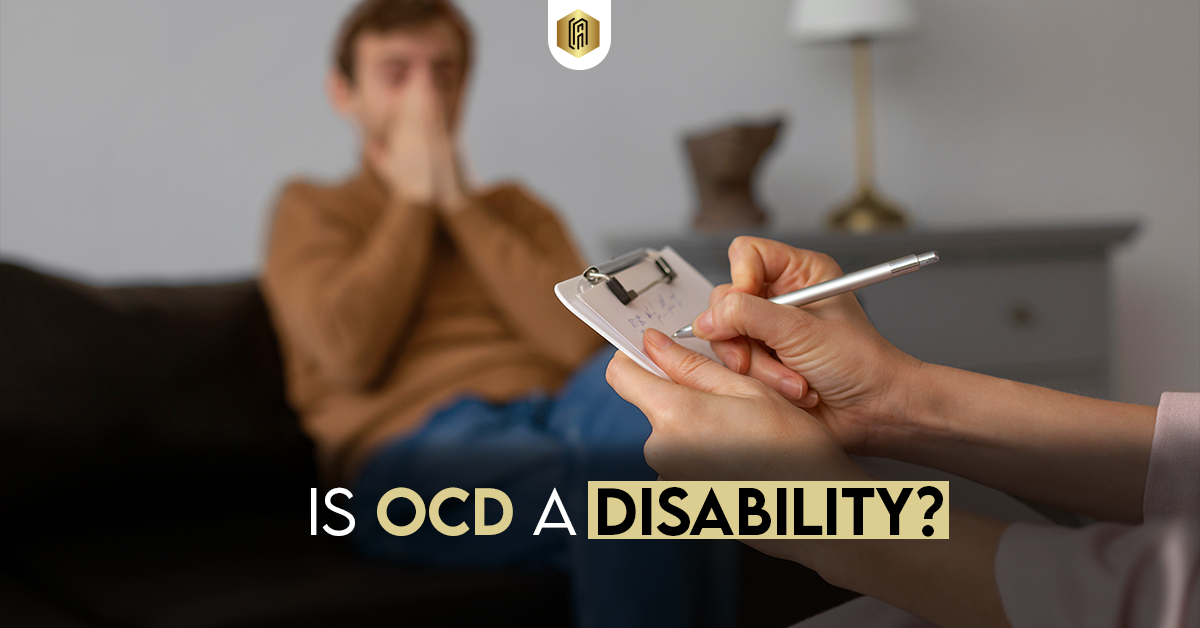Obsessive-Compulsive Disorder, or OCD, affects people differently. But is OCD a disability? For some, OCD makes daily tasks hard and can affect work. We will talk about what OCD is, its effects, and if it counts as a disability. We’ll also look at how it impacts jobs, the support available, and benefits for some.
OCD relief is possible. Ascension Psychiatric Services offers caring, effective treatments to help you live better. Contact us today.
What is OCD?
Obsessive-Compulsive Disorder is a psychological health issue. It leads to unwanted thoughts, called “obsessions.” People also feel compelled to repeat actions, known as “compulsions.” These actions might briefly reduce anxiety. However, anxious feelings return. A person with OCD might wash their hands repeatedly to feel clean. Such habits can be time-consuming. They complicate concentration on work, school, or friends.
Is OCD a Disability?
So, is OCD a disability? OCD affects people differently. For some, it’s minor. For others, it can be crippling, filled with intrusive thoughts and rituals. Severe OCD may limit daily activities. It could be a disability under laws like the ADA (Americans with Disabilities Act). Its severity decides if it’s a mere nuisance or a major restriction. Legal recognition depends on the intensity of symptoms and the impact on daily life.
Is OCD a Mental Disability?
OCD disrupts thoughts, feelings, and actions, similar to other mental disorders. For some, its effects can match those of physical disabilities. This condition changes thinking and behavior, often deeply. Many people struggle with OCD’s constant unwanted thoughts, making daily life hard. The effect on the mind might be as restrictive as a visible disability.
OCD and the Workplace
OCD may cause difficulties for individuals in concentrating and working efficiently. Its fixations and urges consume time and energy, interrupting activities. Some wonder if help is available for managing OCD at work. Under the ADA, protections for OCD exist. This means those whose OCD affects their work can seek support.
How the ADA Helps Employees with OCD
The Americans with Disabilities Act (ADA) is a law to protect people with disabilities. This even covers mental health disorders such as OCD. Might you ask, “Is OCD a disability under the ADA?” Certainly, if it affects routine living, it meets the criteria. The ADA’s goal is to ensure fair work opportunities for those with disabilities. People with OCD can now get help at work. This includes a flexible schedule or adjustments to their workspace, making tasks easier.
Types of Help Available at Work
People with OCD can get different kinds of help, called “accommodations,” to make work easier. Here are some examples:
- Flexible work hours so they can attend therapy appointments.
- Short breaks during work to help manage stress.
- A quieter work area to avoid triggers.
These adjustments support individuals with OCD in feeling more at ease and achieving better outcomes in their work.
Can People with OCD Get Disability Benefits?
Those with OCD may qualify for OCD disability benefits. Their symptoms must be so severe that they cannot work. To apply for these benefits, one must provide evidence that OCD hinders normal activities. Typically, applicants must provide medical proof of how OCD affects their daily lives.
How to Apply for OCD Disability Benefits
To get benefits, a person must show that their OCD is severe enough to hinder work. The Social Security Administration (SSA) has strict criteria, which include:
- Medical records from a doctor or therapist.
- Evidence of treatments that have been tried.
- Proof that symptoms are still serious despite treatment.
For people whose OCD symptoms make life very hard, these benefits can help them financially.
How OCD Affects Everyday Life
OCD significantly affects a person’s everyday life. It not only complicates work but also influences relationships and routine activities. For instance, people with OCD may spend too much time on their routines. This makes it hard to complete other tasks. This is why many assert that “OCD is a disability” deserving empathy and assistance.
OCD and Social Life
People with OCD often struggle to connect with loved ones. Their compulsions can confuse others, leading to tension and isolation. Misunderstandings arise when friends and family don’t grasp these routines. This creates stress in social situations, making them feel alone.
Legal Rights for People with OCD
In the United States, the ADA provides rights to people with conditions like OCD. These rights cover work, school, and housing. Recognizing OCD as a disability under the ADA allows individuals to access the needed support for a better life.
Why OCD Is Considered a Disability
Numerous people with OCD dedicate hours daily to control their symptoms. This usually allows little time for various tasks. This highlights why OCD is a disability for those who experience it severely. OCD can be draining and hard to cope with. So, we must support it and recognize it as a disability.
Treatment Options for OCD
Cognitive Behavioral Therapy and SSRIs provide hope for those with OCD. They target intrusive thoughts and compulsive behaviors, easing symptoms. Though not cures, they are valuable for managing daily challenges. With assistance, individuals can more effectively handle their situations. They might find peace and grow their quality of life. The journey may be tough, but these treatments offer more control and peace.
Managing OCD Symptoms
With appropriate treatment, numerous individuals with OCD can experience significant improvement. Therapy and medication can reduce symptom severity, enabling a fuller enjoyment of life. OCD is often chronic. So, some people may need ongoing support, even if their symptoms improve.
Conclusion: Is OCD a Disability?
In conclusion, “Is OCD a disability?” For numerous individuals, the answer is yes. When OCD symptoms hinder work or daily activities, disability for OCD becomes valid. The ADA and similar laws protect people with OCD. They ensure fair opportunities. Recognizing OCD as a disability makes society more inclusive.
Helping those with OCD creates empathy and inclusivity. It enriches our shared human experience.
FAQs
Does OCD count as a disability?
OCD can be seen as a disability if it significantly disrupts daily life or work. When its symptoms make routine tasks or job duties difficult, it often qualifies.
Can OCD qualify for disability benefits?
Yes, severe OCD can disrupt careers, but disability benefits provide hope. To qualify, you need strong medical proof. Those whose symptoms affect work can find relief in this support. It helps them move from illness to employment.






No comment